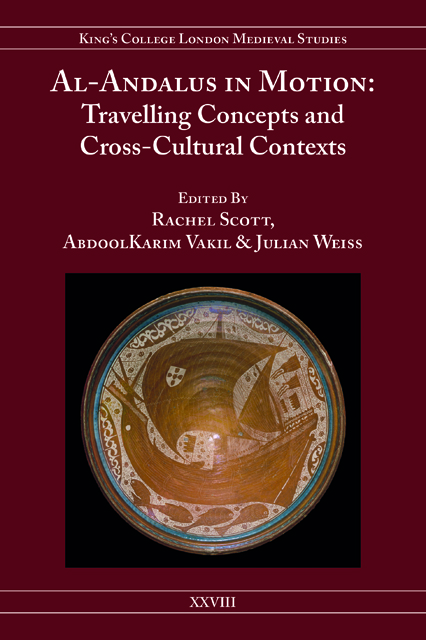Book contents
- Frontmatter
- Contents
- List of Illustrations
- Acknowledgements
- Notes on Contributors
- Part I Departure Points
- Part II Translating Al-Andalus: Travelling across Languages
- Part III (Re)Visions of Al-Andalus in Diaspora and Exile
- Part IV Andalusi Space as Node and Utopia: Europe, Islam, Empire
- Part V Al-Andalus and the Politics of Religious Identity
- Part VI Legacies, Landscapes and ‘Travel Buildings’
- Epilogue
- Index
2 - Translating Tales of True Friendship out of Al-Andalus: The Medieval Castilian and Hebrew Translations of Kalila wa-Dimna
Published online by Cambridge University Press: 02 June 2023
- Frontmatter
- Contents
- List of Illustrations
- Acknowledgements
- Notes on Contributors
- Part I Departure Points
- Part II Translating Al-Andalus: Travelling across Languages
- Part III (Re)Visions of Al-Andalus in Diaspora and Exile
- Part IV Andalusi Space as Node and Utopia: Europe, Islam, Empire
- Part V Al-Andalus and the Politics of Religious Identity
- Part VI Legacies, Landscapes and ‘Travel Buildings’
- Epilogue
- Index
Summary
Wisdom literature, that is works that use exemplary fables, parables and aphorisms to provide practical and moral guidance to readers, has been described as a ‘singularly mobile genre’ (Marlow 2013: 2). It was a tradition shared across religious boundaries, with specific texts frequently translated between Judaism, Christianity and Islam. An example of this movement can be found in the collection of exemplary fables known in Arabic as Kalila wa-Dimna, which was composed in Baghdad around 750 CE by a Persian convert to Islam named Ibn al-Muqaffa. This book had a strong presence in the Iberian Peninsula during the Middle Ages. Ibn al-Muqaffa's translation likely came to al-Andalus at some point during the Umayyad Caliphate, and thereafter circulated in Arabic orally and in numerous manuscripts (Cacho Blecua and Lacarra 1984: 13). During the twelfth and thirteenth centuries it was translated three times from the Arabic: once into Castilian and twice into Hebrew. The Castilian Calila e Dimna was made in 1251 at the behest of the soonto- be King Alfonso X while still infante. Exact dates for the two Hebrew translations are not known; the earliest, attributed to a mysterious ‘Rabbi Joel’, has been dated between the late twelfth and the middle of the thirteenth century given that the Latin translation based on this by Juan de Capua, the Directorium humanae vitae, which became the source for later translations of the book into vernacular European languages, was completed between 1262 and 1278. The second Hebrew version, a translation in rhymed prose by the Toledan scholar and poet Jacob ben Eleazar, has been dated to the start of the thirteenth century.
Kalila wa-Dimna exemplifies how medieval wisdom literature functioned as a site of shared cultural heritage, a topic that has been addressed by Luis Girón-Negrón (2005), Y. Tzvi Langermann (2012) and Oded Zinger and David Torollo (2016) in recent years in relation to both this collection of fables as well as to other works of this genre. Indeed, given the ease with which it appears to have moved between religions and cultures, previous scholarship has tended to view the book as possessing universal meaning.
- Type
- Chapter
- Information
- Al-Andalus in MotionTravelling Concepts and Cross-Cultural Contexts, pp. 55 - 80Publisher: Boydell & BrewerPrint publication year: 2021



